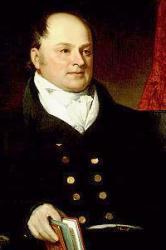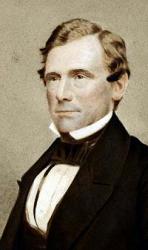Planning worship?
Check out our sister site, ZeteoSearch.org,
for 20+ additional resources related to your search.
- |
User Links
Person Results
Felix Mendelssohn-Bartholdy

1809 - 1847 Person Name: Felix Bartholdy Mendelssohn Composer of "TRUST" in The American Hymnal for Chapel Service Felix Mendelssohn-Bartholdy (b. Hamburg, Germany, 1809; d. Leipzig, Germany, 1847) was the son of banker Abraham Mendelssohn and the grandson of philosopher Moses Mendelssohn. His Jewish family became Christian and took the Bartholdy name (name of the estate of Mendelssohn's uncle) when baptized into the Lutheran church. The children all received an excellent musical education. Mendelssohn had his first public performance at the age of nine and by the age of sixteen had written several symphonies. Profoundly influenced by J. S. Bach's music, he conducted a performance of the St. Matthew Passion in 1829 (at age 20!) – the first performance since Bach's death, thus reintroducing Bach to the world. Mendelssohn organized the Domchor in Berlin and founded the Leipzig Conservatory of Music in 1843. Traveling widely, he not only became familiar with various styles of music but also became well known himself in countries other than Germany, especially in England. He left a rich treasury of music: organ and piano works, overtures and incidental music, oratorios (including St. Paul or Elijah and choral works, and symphonies. He harmonized a number of hymn tunes himself, but hymnbook editors also arranged some of his other tunes into hymn tunes.
Bert Polman
Felix Mendelssohn-Bartholdy
Joseph Haydn

1732 - 1809 Person Name: Franz Josef Haydn Composer of "AUSTRIA (Haydn)" in The Cyber Hymnal Franz Joseph Haydn (b. Rohrau, Austria, 1732; d. Vienna, Austria, 1809) Haydn's life was relatively uneventful, but his artistic legacy was truly astounding. He began his musical career as a choirboy in St. Stephen's Cathedral, Vienna, spent some years in that city making a precarious living as a music teacher and composer, and then served as music director for the Esterhazy family from 1761 to 1790. Haydn became a most productive and widely respected composer of symphonies, chamber music, and piano sonatas. In his retirement years he took two extended tours to England, which resulted in his "London" symphonies and (because of G. F. Handel's influence) in oratorios. Haydn's church music includes six great Masses and a few original hymn tunes. Hymnal editors have also arranged hymn tunes from various themes in Haydn's music.
Bert Polman
Joseph Haydn
John Zundel
1815 - 1882 Composer of "BEECHER" in A Hymnal for Joyous Youth John Zundel; b. 1815, near Stuttgart, Germany; organist in Brooklyn, N. Y., from 1847 to 1878; d. Cannstadt, Germany, 1882
Evangelical Lutheran Hymnal, 1908
John Zundel
John Bacchus Dykes

1823 - 1876 Person Name: J. B. Dykes Composer of "SANCTUARY" in Hymns of Worship and Service As a young child John Bacchus Dykes (b. Kingston-upon-Hull' England, 1823; d. Ticehurst, Sussex, England, 1876) took violin and piano lessons. At the age of ten he became the organist of St. John's in Hull, where his grandfather was vicar. After receiving a classics degree from St. Catherine College, Cambridge, England, he was ordained in the Church of England in 1847. In 1849 he became the precentor and choir director at Durham Cathedral, where he introduced reforms in the choir by insisting on consistent attendance, increasing rehearsals, and initiating music festivals. He served the parish of St. Oswald in Durham from 1862 until the year of his death. To the chagrin of his bishop, Dykes favored the high church practices associated with the Oxford Movement (choir robes, incense, and the like). A number of his three hundred hymn tunes are still respected as durable examples of Victorian hymnody. Most of his tunes were first published in Chope's Congregational Hymn and Tune Book (1857) and in early editions of the famous British hymnal, Hymns Ancient and Modern.
Bert Polman
John Bacchus Dykes
Joseph Barnby

1838 - 1896 Composer of "CARLTON" in The Abingdon Hymnal Joseph Barnby (b. York, England, 1838; d. London, England, 1896) An accomplished and popular choral director in England, Barby showed his musical genius early: he was an organist and choirmaster at the age of twelve. He became organist at St. Andrews, Wells Street, London, where he developed an outstanding choral program (at times nicknamed "the Sunday Opera"). Barnby introduced annual performances of J. S. Bach's St. John Passion in St. Anne's, Soho, and directed the first performance in an English church of the St. Matthew Passion. He was also active in regional music festivals, conducted the Royal Choral Society, and composed and edited music (mainly for Novello and Company). In 1892 he was knighted by Queen Victoria. His compositions include many anthems and service music for the Anglican liturgy, as well as 246 hymn tunes (published posthumously in 1897). He edited four hymnals, including The Hymnary (1872) and The Congregational Sunday School Hymnal (1891), and coedited The Cathedral Psalter (1873).
Bert Polman
Joseph Barnby
John Quincy Adams

1767 - 1848 Author of "Heaven is here, where hymns of gladness" in The Wesleyan Methodist Hymnal Adams, John Quincy. (Braintree, Mass., July 11, 1767-February 21, 1848, Washington, D.C.). Most of Adams' verse, both religious and secular, was written after he had left the Presidency. In his later years he composed a metrical version of the Psalms, best described as a free rendering in fairly good verse of what he felt was the essential idea of each Psalm. When his minister, William P. Lunt, of the First Parish, (Unitarian), Quincy, Mass., undertook the preparation of his hymn book The Christian Psalter, Mrs. Adams put the manuscript of her husband's metrical Psalms into Lunt's hands, and the latter included 17 of them in his book, and five other hymns by his distinguished parishioner.
The effect on Adams is recorded in a moving entry in his Journal which reveals an aspect of his character quite unknown to those who regarded him as an opinionated and uncompromising though sincere and upright politician. He wrote on June 29, 1845:
"Mr. Lunt preached this morning, Eccles. III, 1. For everything there is a season. He had given out as the first hymn to be sung the 138th of the Christian Psalter, his compilation and the hymn-book now used in our church. It was my version of the 65th Psalm; and no words can express the sensations with which I heard it sung. Were it possible to compress into one pulsation of the heart the pleasure which, in the whole period of my life, I have enjoyed in praise from the lips of mortal man, it would not weigh a straw to balance the ecstasy of delight which streamed from my eyes as the organ pealed and the choir of voices sung the praise of Almighty God from the soul of David, adapted to my native tongue by me. There was one drawback. In the printed book, the fifth line of the second stanza reads, "The morning's dawn, the evening's shade," and so it was sung, but the corresponding seventh line of the same stanza reads, "The fields from thee the rains receive," totally destroying the rhyme. I instantly saw that the fifth line should read, "The morning's dawn, the shades of eve," but whether this enormous blunder was committed by the copyist of the pressman I am left to conjecture."
After Adams' death his verses, both religious and secular, were published in a small volume entitled Poems of Religion and Society, New York, 1848, which ran to a fourth edition in 1854. This collection included the five hymns and 17 metrical Psalms printed in the Christian Psalmist, unchanged except that the opening line of each psalm has been substituted for the number of the psalm as its heading. Nor was the misprint which Adams lamented amended.
--Henry Wilder Foote, DNAH Archives
=================================
Adams, John Quincy. Born at Braintree (afterwards called Quincy), Mass., 1767, was a son of President Adams. After graduating at Harvard College he was, from 1794 to 1801, minister to the Netherlands, to England, and to Prussia. In 1806 he was appointed Professor of Rhetoric in Harvard College; in 1809 minister to Russia; 1817 Secretary of State; and, from 1824 to 1829, President of the United States. In 1831 he was elected a Member of the House of Representatives. Died suddenly, Feb. 21, 1848. His high position and principle are well known, as also the incidents of his political life. He was a member of the Unitarian body. His Memoir, by the Hon. Josiah Quincy, was published soon after his death, and also his Poems of Religion and Society, N. Y., 1848 (4th ed., 1854). He wrote, but never printed, an entire Version of the Psalms, seventeen of which, with five hymns, were inserted by his pastor, Dr. Lunt, in the Christian Psalmist, 1841. Of these the following are still in use:—
1. Sure to the mansions of the blest. [Burial.] This is part of a piece of 20 stanzas, which appeared in the Monthly Anthology and Boston Review, Jan., 1807. It is entitled "Lines addressed to a mother on the death of two infants, 19th Sept. 1803, and 19th Decr., 1806."
2. Alas! how swift the moments fly. [Time.] Sometimes given as "How swift, alas, the moments fly," was written for the 200th anniversary of the First Congregational Church, Quincy, Sept. 29, 1839.
3. Hark! 'tis the holy temple bell. [Sunday.] Of these Nos. 2 and 3 are found in Lyra Sacra Americana and 2 in Putnam's Singers and Songs of the Liberal Faith, 1875. [Rev. F. M. Bird, M.A.]
-- John Julian, Dictionary of Hymnology (1907)
John Quincy Adams
Lizzie Tourjée
1858 - 1913 Person Name: Lizzie S. Tourjee Composer of "WELLESLEY" in The Wesleyan Methodist Hymnal Lizzie Shove Tourjee Estabrook USA 1858-1913. Born in Newport, RI, daughter of a famed music educator, organist, and composer, he encouraged her efforts at composing. When 17, she composed the tune for the famous hymn “Wellesley”. When her father, founder of the New England Conservatory of Music, became editor of the Methodist hymnal, he included her tune in the 1878 edition of the book, naming it for the college she attended, as she had written the tune while attending that school. She married Franklin Estabrook in 1883. They had a son, Rufus. She taught music and was an organist in Auburndale, MA. She died in Newton, MA.
John Perry
Lizzie Tourjée
John G. Adams

1810 - 1887 Person Name: John Adams Author of "Heaven Is Here, Where Hymns of Gladness" in The Cyber Hymnal Adams, John Greenleaf. Co-editor with Dr. E. H. Chapin of the Universalist Hymns for Christian Devotion, 1846; and, alone, of the Gospel Psalmist, 1861. He was born in Portsmouth, New Hampshire, 1810. The collections named contain in each case 16 hymns by him. They are not, however, received outside his sect. The best are:—
1. Heaven is here, its hymns of gladness. [Peace.] Contributed to the Hymns for Christian Devotion, 1846, No. 419, in 4 stanzas of 4 lines.
2. God's angels! not only on high do they sing. [Ministry of Angels.] No. 830 in his Gospel Psalmist, 1861, and No. 240 in Longfellow and Johnson's Hymns of the Spirit, Boston, 1864. [Rev. F. M. Bird, M.A.]
--John Julian, Dictionary of Hymnology, (1907)
John G. Adams
Darius E. Jones
1815 - 1881 Person Name: D. E. Jones Composer of "STOCKWELL" in The Hymnal of Praise
Darius E. Jones
John E. Roe
1838 - 1871 Composer of "WESTON" in Hymns of the Spirit for Use in the Free Churches of America
John E. Roe


 My Starred Hymns
My Starred Hymns


